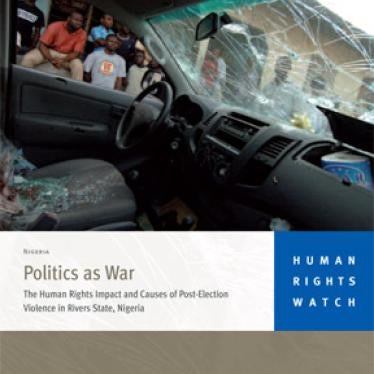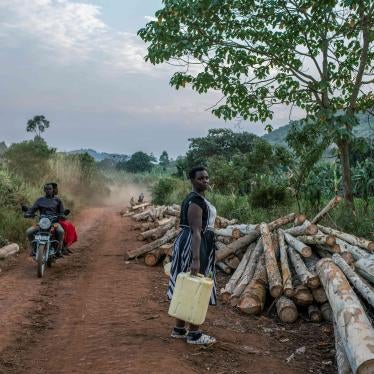(Abuja) - The Nigerian government’s failure to hold accountable politicians and gang leaders responsible for a deadly wave of post-election violence in the oil-rich Niger Delta threatens to bring further bloodshed, Human Rights Watch said in a report released today.
For six weeks in July and August 2007, dozens of people were killed and more than 150 injured when armed gangs – competing for a greater share of illegal state government handouts – staged pitched battles in the streets of Port Harcourt, the Rivers State capital. Using automatic weapons, explosives, and machetes, the gangs not only fought each other, but blighted the lives of ordinary Nigerians as they sat drinking at bars, walking home from work, or sitting outside their homes.
“The politicians and gang leaders behind these brutal attacks have openly fomented violence for years untouched by the law,” said Georgette Gagnon, Africa director at Human Rights Watch. “The Nigerian government’s failure to bring anyone to justice is a disgrace; it gives the gangs and their sponsors carte blanche to continue the violence.”
The 55-page report, “Politics as War,” is based on a two-week research mission that included interviews with victims, politicians, gang leaders, and law enforcement officials. The report found that Rivers’ gangs have grown powerful and violent through ties to influential politicians and because of the impunity long accorded them by political leaders and law enforcement agencies.
Rivers State has a long history of gang violence. In recent years, Rivers’ gangs have fought with one another over territory and as proxies of rival politicians. They have kidnapped scores of expatriate oil workers and wealthy Nigerians for ransom, including three young children in the past two months alone. The gangs have also robbed banks, burned police stations and murdered police officers in the streets. And in the course of all this, they have subjected entire neighborhoods and communities to violence and terror.
Much of the latest fighting pitted members of the Outlaws gang, led by Soboma George, against a loose coalition of gangs allied with the Ateke Tom-led Icelanders. Both men rose to power through ties to prominent Rivers politicians. According to gang members, civil society activists and ordinary residents who bore its brunt, the July and August violence was primarily a turf war over access to government patronage. Ateke Tom and others believed that this patronage was being unfairly concentrated in the hands of Soboma George. Based on its findings, Human Rights Watch concludes that Soboma George and his gang had close ties to the administration of former Governor Celestine Omehia and played a role in rigging the fraudulent 2007 elections in Rivers State.
In August 2007, the violence reached such a crescendo that the federal government ordered soldiers from the military-led Joint Task Force (JTF) to intervene and stop it. JTF forces quickly drove gang members out of the city and restored a measure of calm. But the JTF failed to apprehend Soboma George, Ateke Tom or other prominent gang leaders implicated in the violence. Human Rights Watch also documented numerous serious human rights abuses committed by JTF forces.
“The gang warfare that claimed scores of lives in Port Harcourt was a widely predicted aftershock of Nigeria’s rigged 2007 polls,” Gagnon said. “The government still has time to intervene and address the roots of Rivers’ chronic violence if it wants to.”
The failure of the Nigerian government and federally administered police to investigate and bring to justice responsible government officials and gang leaders threatens to return chronic and uncontrollable gang violence to Rivers State. In recent months, kidnappings and other forms of gang violence have increased in frequency again.
President Umaru Yar’Adua came into office 2007 pledging to uphold the rule of law in Nigeria. But that commitment rings hollow in the face of the impunity enjoyed by powerful Niger Delta politicians whose serious crimes lie at the root of the Niger Delta crisis, said Human Rights Watch. Although the federal government recently charged prominent militant commander and alleged arms dealer Henry Okah with treason, this is not a meaningful gesture against impunity if the government’s political allies are not prosecuted for their role in perpetrating similar crimes.
“President Yar’Adua continues to indulge in sweeping rhetoric about his administration’s respect for the rule of law,” Gagnon said. “But the rule of law means nothing if powerful politicians can freely arm gangs that take lives and shatter families.”
Along with grief, many victims of the recent gang violence expressed a profound sense of anger at the impunity enjoyed by the politicians they consider responsible for their suffering. “Government never wants to do anything because they are involved. They are in power. They could stop it if they want to,” said the husband of a woman who was killed while walking home by rampaging gang members.
Gang violence has been an ongoing problem in Rivers State since Nigeria’s bloody and fraudulent 2003 elections. That year, prominent Rivers politicians, including then- Governor Peter Odili, sponsored, paid and armed criminal gangs to help rig the polls in favor of the ruling People’s Democratic Party (PDP). Since then, the gangs have grown more numerous, more powerful and more brazen, so the politicians who helped build the gangs can no longer control them. Many gang leaders’ relationships with their onetime political sponsors have soured, with gangs accusing politicians of failing to follow through on promises of money, jobs, and education.






